Overview
This article presents a compassionate approach to finding the best elder home care services, guiding you through essential steps and considerations. It begins by recognizing the importance of assessing individual needs, which is crucial for ensuring that your loved ones receive the appropriate support they deserve. Researching local providers is a vital step, as it allows you to explore the options available in your community.
As you delve deeper, interviewing candidates becomes an opportunity to connect personally and understand their approach to care. This process not only helps in selecting the right caregiver but also reassures you that your family member will be treated with dignity and respect. Customizing care plans is the final piece of this puzzle, ensuring that the services provided are tailored to the unique circumstances of each individual.
In addition, remember that you are not alone in this journey. We’re here for you, ready to support you in making the best decisions for your loved ones. Your comfort and peace of mind are our priorities, and we encourage you to take these steps to secure compassionate care that meets their needs.
Introduction
As our loved ones age, the demand for elder home care services has surged, leading families to seek tailored solutions that truly meet their unique needs. These compassionate services encompass a variety of support options, from personal care and companionship to skilled nursing and respite care, all designed to enhance the quality of life for seniors while providing essential assistance.
With more seniors choosing home care, understanding the different types of services available becomes crucial for families navigating this complex landscape. This article delves into the essential components of elder home care, guiding families through the process of selecting the right provider and customizing care plans, ensuring that their loved ones receive the best possible support.
We’re here for you, and your comfort is our priority.
Understand Elder Home Care Services
Elder home care near me provides various forms of support designed to help older adults in their everyday activities. These offerings can be classified into four primary categories:
- Personal Care: This encompasses help with essential daily activities such as bathing, dressing, and grooming, which are vital for upholding personal hygiene and dignity. Caregivers offer this assistance to help older adults prevent health issues linked to inadequate hygiene and to improve their overall well-being.
- Companionship: Offering social interaction and emotional support is crucial for addressing loneliness, which is a prevalent concern among the elderly. Companionship assistance helps nurture relationships and enhance overall wellness, reducing feelings of loneliness and sadness.
- Skilled Nursing: Medical treatment provided by registered nurses includes medication management, wound treatment, and other health-related offerings. This level of support is crucial for seniors with chronic conditions or those healing from surgery, ensuring that health issues are observed and handled efficiently.
- Respite Assistance: This provision offers temporary relief for primary providers, allowing them to take necessary breaks while ensuring their loved ones receive quality support. Respite support is essential for avoiding provider burnout and sustaining family dynamics, offering reassurance for families.
In addition to these categories, CNA/HHA assistance delivers considerable advantages such as household management, which encompasses help with cleaning and laundry, fostering a secure and orderly living space. The adaptability and personalization of caregiver offerings enable families to adjust support to their loved ones’ unique requirements and timetables. Grasping these categories allows families to evaluate the particular needs of their loved ones and pinpoint the most advantageous type of support. As of 2025, around 12% of elderly individuals make use of home support options, indicating a rising trend towards tailored assistance solutions. Notably, adults older than 85 are the most prominent demographic among residents in assisted living facilities, highlighting the need for tailored support in this age group. Furthermore, the assisted living sector is anticipated to expand by 4.2% annually, emphasizing the rising need for these offerings. With the aging population, especially those over 85, the demand for elder home care near me is anticipated to increase significantly, underscoring the necessity of sustainable solutions in improving the quality of life for seniors.
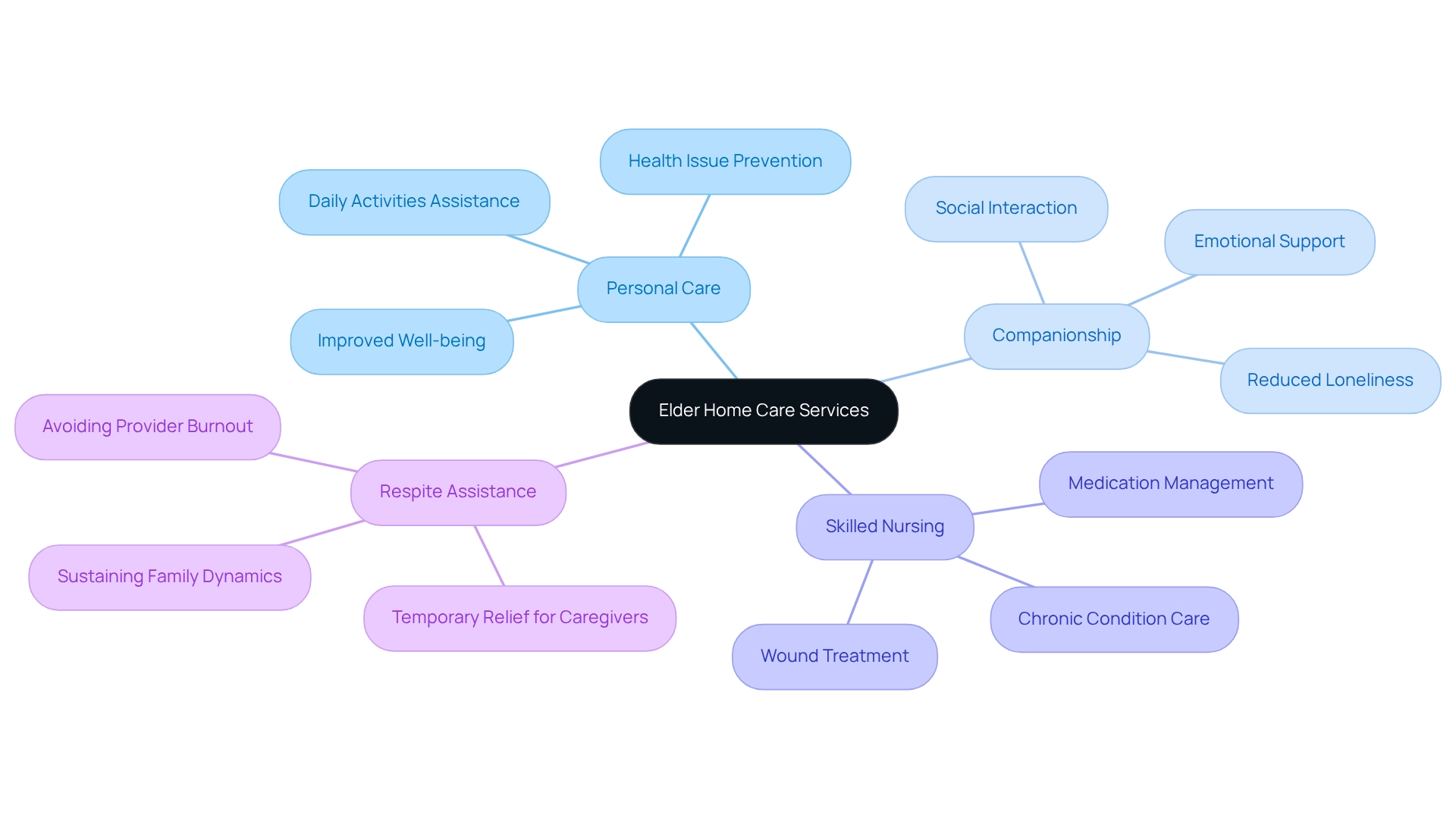
Identify Key Factors for Selection
When selecting an elder home care provider, several key factors should guide your decision-making process:
- Qualifications and Licensing: It’s vital to verify that the agency is properly licensed and that caregivers possess the necessary certifications. This ensures adherence to state regulations and a standard of practice that meets professional benchmarks.
- Experience: Seek providers with a proven track record in elder assistance, especially those knowledgeable about specific conditions such as dementia or chronic illnesses. Caregivers with relevant experience are better equipped to handle the unique challenges that may arise.
- Reputation: Investigate reviews and testimonials from other families to assess the quality of care provided. A strong reputation often reflects consistent, high-quality service and client satisfaction.
- Compatibility: Evaluate whether the caregivers’ personalities and approaches align with your loved one’s preferences and needs. A suitable pairing can greatly improve the comfort and efficiency of assistance.
- Flexibility: Verify that the agency provides customizable support plans that can adjust to evolving requirements over time. Flexibility is crucial for accommodating the changing needs of elderly clients, ensuring they receive appropriate support as their situations change.
Understanding these elements is crucial. A remarkable 85% of older adults receiving home assistance indicate feeling more secure and at ease in their own residences. The advantages of home health assistance extend beyond mere safety and convenience; they also encompass emotional support and companionship, which are essential for enhancing the quality of life for older adults. Moreover, recognizing the risks faced by seniors without CNA/HHA services—such as health decline, poor nutrition, and social isolation—underscores the importance of professional caregiving. By prioritizing qualifications, experience, reputation, compatibility, and flexibility, families can make informed choices that enhance the quality of life for their loved ones.
Best Care Nurses Registry provides tailored support plans and companionship to ensure that your loved ones receive the assistance they require. As Jim Rohn wisely stated, “One person caring about another represents life’s greatest value,” highlighting the importance of compassion in caregiver selection. Furthermore, patients obtaining support at home experience greater satisfaction with their overall quality of life compared to those in institutional environments, emphasizing the significance of making informed decisions.
To learn more about how we can assist you and your family, call Best Care Nurses Registry at (888) 203-2529 to schedule a consultation.
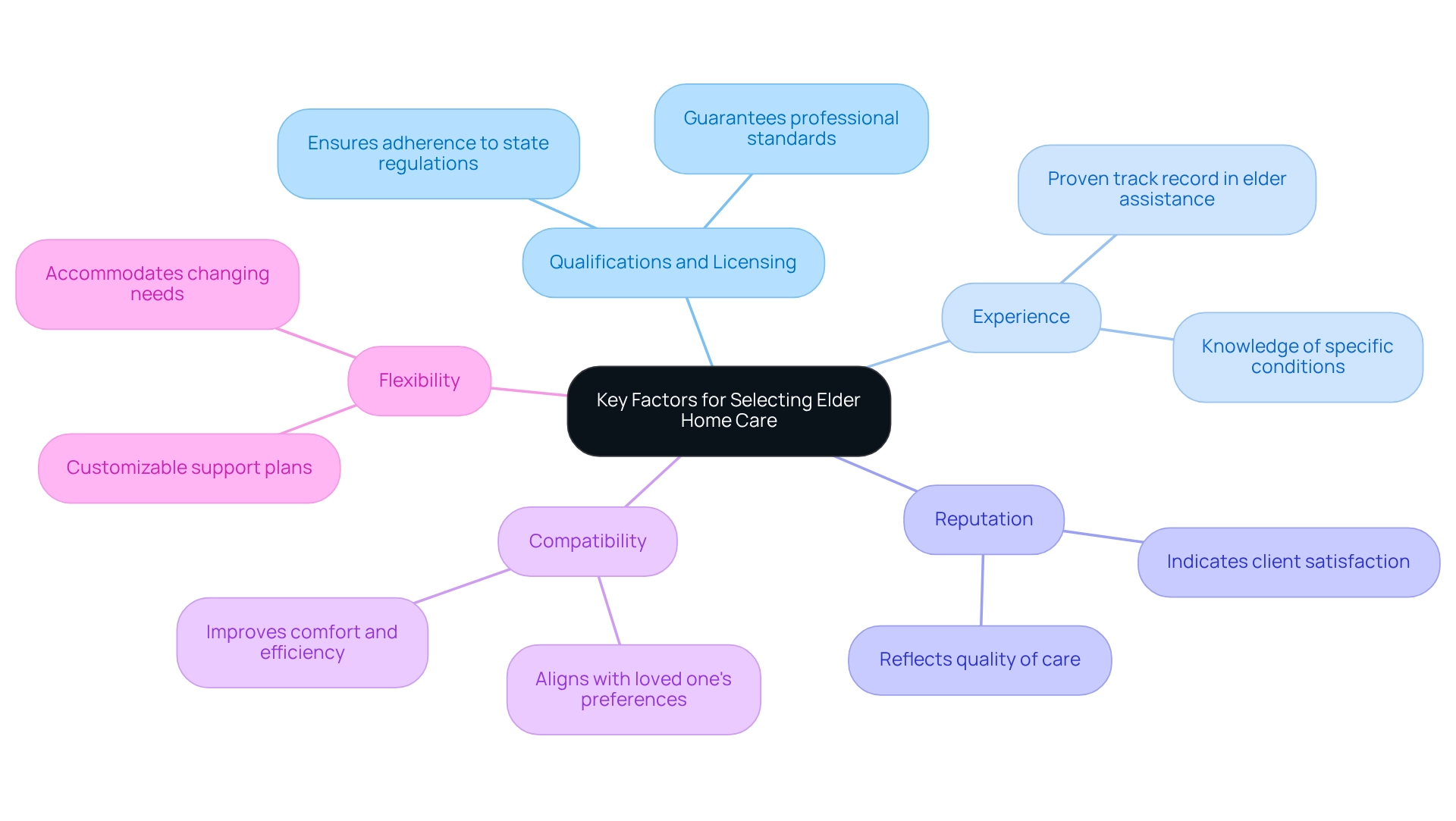
Research and Compare Local Providers
To effectively research and compare providers of elder home care near me, it’s essential to approach this task with care and consideration for your loved ones’ needs. Here are some steps to guide you:
- Utilize Online Resources: Start by leveraging websites such as Medicare.gov and Eldercare Locator. These platforms can help you identify licensed providers in your area, making it easier to find elder home care near me with their comprehensive listings that streamline your search.
- Read Reviews: Explore review platforms like Caring.com and Yelp to gauge the experiences of other families. Average ratings can provide valuable insight into the quality of services offered by various agencies, assisting you in making informed choices.
- Ask for Recommendations: Reach out to healthcare professionals, friends, or family members who have firsthand experience with local agencies. Personal recommendations can lead you to trustworthy providers of elder home care near me who genuinely care about their clients.
- Contact Agencies: Don’t hesitate to reach out to potential providers to inquire about their services, availability, and pricing. This direct communication can clarify any questions you may have, allowing you to assess their responsiveness and professionalism.
- Schedule Visits: If feasible, consider visiting the agencies to meet staff and observe their operations firsthand. This step enables you to evaluate the surroundings and ensure they align with your expectations for assistance, particularly in finding elder home care near me.
Research shows that the home support industry employs over 1.5 million individuals in the United States, highlighting its important role in aiding the elderly. Furthermore, studies emphasize the crucial role of home support providers in improving seniors’ personal hygiene and grooming, which are vital for preserving dignity and health. Indicators suggesting the need for CNA/HHA caregiver assistance include difficulty with personal hygiene, dressing, cooking, and managing medications.
Significantly, there are roughly 14 million Americans over the age of 80, underscoring the increasing need for in-home assistance services. The home support industry is evolving to meet diverse needs, making it crucial to explore various options for elder home care near me. Moreover, incorporating healthy home cooking into support plans can enhance the overall well-being of elderly individuals.
By following these steps, you can confidently navigate the complex landscape of elder support services. Remember, your loved ones deserve the best care, and we’re here to help you find the perfect fit for their needs.
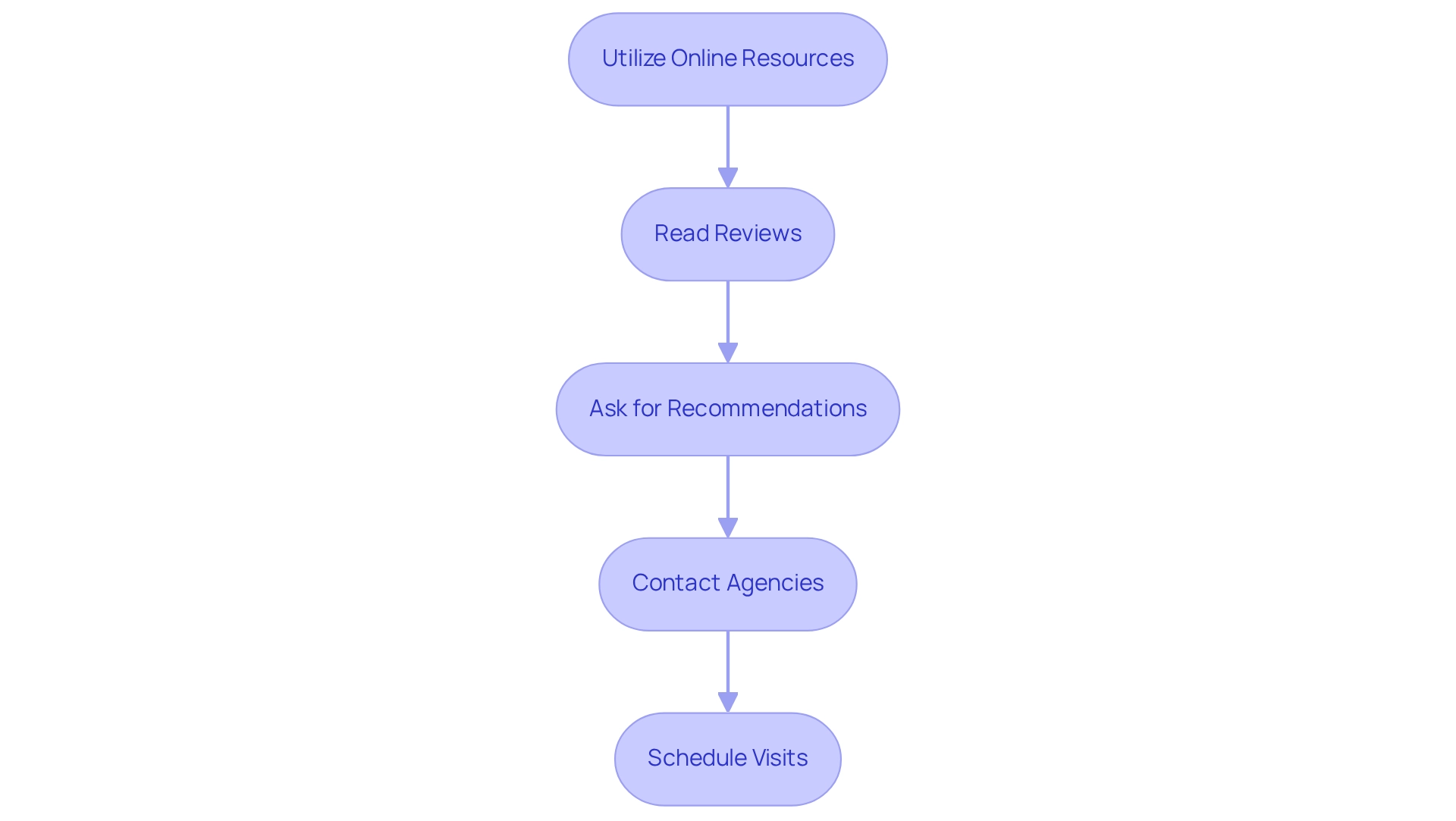
Customize Care Plans to Fit Individual Needs
Developing a personalized support plan for seniors is crucial for ensuring that their needs are effectively addressed. Let’s explore the key steps to create a tailored approach:
-
Assess Needs: Start with a comprehensive evaluation of your loved one’s physical, emotional, and social requirements. This assessment should consider their medical history, daily routines, and personal preferences.
-
Involve the Individual: Actively engage your loved one in conversations about their preferences for support. Involving them in decision-making fosters a sense of autonomy and ensures their wishes are respected, which is vital for emotional stability.
-
Set Goals: Define clear and achievable goals that prioritize enhancing independence and improving quality of life. Goals should be realistic and reflect the individual’s aspirations, such as maintaining social connections or effectively managing health conditions.
-
Choose Options: Based on the evaluation and set objectives, select suitable offerings that align with your loved one’s needs. At Best Care Nurses Registry, this process involves a straightforward three-step method:
- First, call to discuss your needs with our welcoming team;
- Second, collaborate with your loved one and their physician to develop a customized support plan;
- Third, choose from compassionate professionals who best suit your family’s needs.
-
Review Regularly: Schedule regular assessments of the plan to modify provisions as requirements change. Regular evaluations ensure that the support offered remains relevant and effective, adapting to any changes in health or personal situations.
Statistics indicate that over 80% of family caregivers report that their loved ones’ preferences are considered in customized support plans. This highlights the significance of tailored methods in providing elder home care near me. Additionally, the cost per visit for home health services ranges from $132 to $230, depending on the state and region, underscoring the financial considerations involved in selecting appropriate options. Involving a geriatric management professional can enhance efficient long-term planning, offering families crucial guidance and resources. This approach is supported by case studies showcasing the benefits of personalized assistance, such as increased satisfaction and positive outcomes for older adults. Moreover, embracing technological advancements can foster innovation in the home support sector, enhancing service provision and improving planning. By following these steps, families can develop a tailored support plan that addresses the immediate needs of seniors while enhancing their overall well-being and independence. For more information or to begin with a personalized support plan, reach out to Best Care Nurses Registry today!
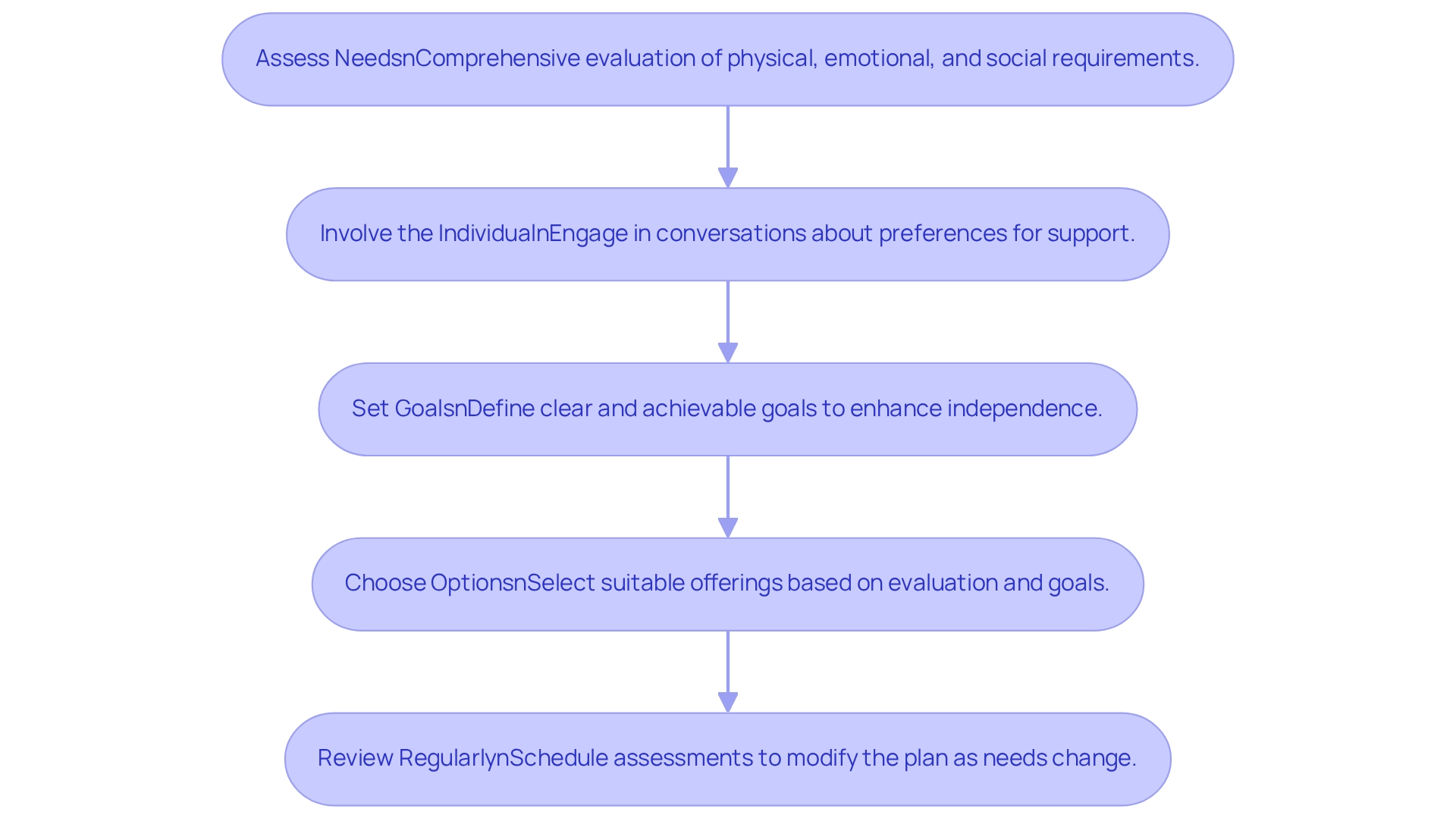
Conduct Interviews and Make Informed Choices
When interviewing prospective assistants, it is crucial to adopt a structured method to ensure you find the best match for your loved one. Here are key strategies to consider:
-
Prepare Questions: Start by creating a comprehensive list of inquiries that address the provider’s experience, qualifications, and their approach to support. This will assist you in assessing their appropriateness for your particular requirements. It’s essential to consider crucial elements such as their training as a CNA or HHA, which can greatly influence the quality of assistance given.
-
Assess Communication Skills: Effective communication is vital in caregiving. Observe how well the provider expresses their thoughts and whether they actively listen to your concerns. This can significantly influence the quality of support. Open communication ensures that your loved one’s needs are met and that any issues are promptly addressed.
-
Discuss Scenarios: Present hypothetical situations that may arise in caregiving. Inquire about their responses to these scenarios to understand their problem-solving abilities and emotional intelligence. This can demonstrate how they would address particular challenges associated with personal assistance or health management, which are prevalent in elder home care near me.
-
Evaluate Compatibility: Consider the individual’s personality and values. A strong alignment with your loved one’s preferences can foster a more comfortable and trusting relationship, which is essential for effective support. This compatibility is vital for guaranteeing that the supporter can offer tailored assistance that honors your loved one’s dignity and choices.
-
Check References: Always request and follow up on references. Checking a provider’s background and dependability through former employers or clients can offer valuable perspectives on their work ethic and professionalism. This step is crucial in ensuring that you select a provider who has a proven track record of delivering quality care.
By implementing these strategies, families can improve their selection process for elder home care near me, ensuring they choose someone who not only meets the necessary qualifications but also aligns with the emotional and personal needs of their loved ones. This method is backed by case studies showing that efficient selection of health providers can result in better health outcomes and fewer hospital readmissions for elderly individuals. For example, the case study titled “Home Support: A Key to Curbing Costly Hospital Returns” emphasizes how introducing home support services effectively decreases hospital readmissions, resulting in reduced healthcare expenses and improved health outcomes for seniors. Furthermore, caregivers often extend their roles beyond direct care to advocacy and support, emphasizing the importance of selecting someone who can provide comprehensive assistance. As an unknown source aptly puts it, “In the language of caregiving, love is spoken through actions, kindness, and unwavering presence.
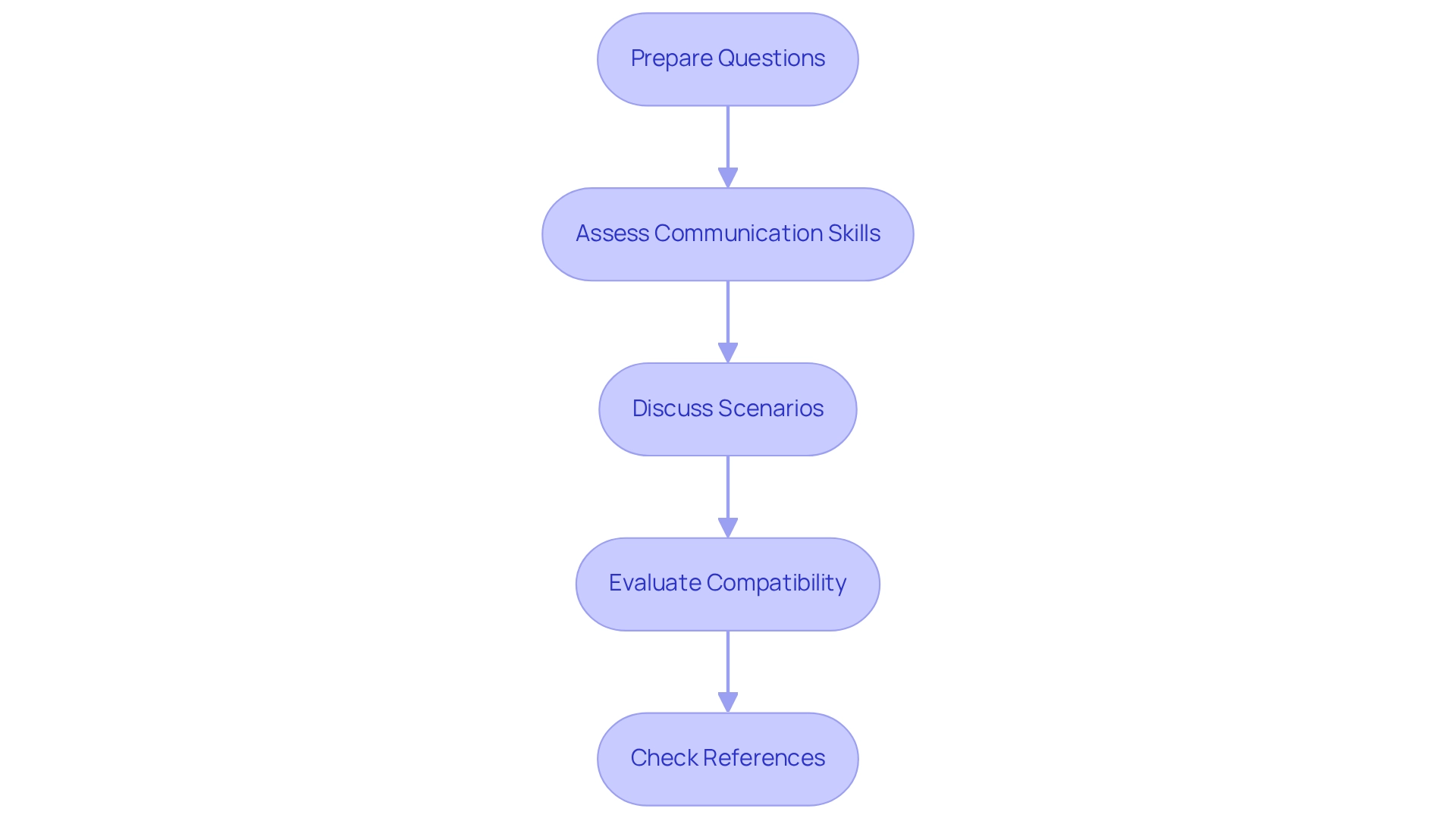
Conclusion
Elder home care services play a crucial role in enhancing the quality of life for seniors, providing personalized support through:
- Personal care
- Companionship
- Skilled nursing
- Respite care
By understanding these options, families can select the best care solutions that honor the dignity and independence of their loved ones.
Choosing the right provider is a significant decision that requires careful consideration of:
- Qualifications
- Experience
- Reputation
- Compatibility
- Flexibility
These factors are essential in delivering high-quality care that adapts to the changing needs of seniors. Families can streamline their search by utilizing online resources, reading reviews, and seeking recommendations from trusted sources.
Customizing care plans is vital for effectively addressing individual requirements. Involving seniors in the planning process fosters a sense of autonomy, while regular reviews of these plans ensure that care remains relevant as circumstances evolve.
Ultimately, the goal of elder home care is to create a supportive environment where seniors can thrive. By emphasizing compassion and informed decision-making, families can secure the care their loved ones deserve, enriching their lives and promoting overall well-being. As the demand for elder home care grows, making thoughtful choices will be essential in shaping a brighter future for seniors. Remember, we’re here for you, and your comfort is our priority.
Frequently Asked Questions
What types of support are included in elder home care?
Elder home care provides four primary types of support: Personal Care (assistance with daily activities like bathing and dressing), Companionship (social interaction and emotional support), Skilled Nursing (medical treatment by registered nurses), and Respite Assistance (temporary relief for primary caregivers).
How does personal care benefit older adults?
Personal care helps older adults maintain personal hygiene and dignity by assisting with essential daily activities, which can prevent health issues related to poor hygiene and improve overall well-being.
Why is companionship important for seniors?
Companionship addresses loneliness, a common issue among the elderly, by offering social interaction and emotional support, which enhances overall wellness and reduces feelings of sadness.
What services are included in skilled nursing care?
Skilled nursing care includes medical treatments such as medication management, wound care, and monitoring health issues, which is essential for seniors with chronic conditions or those recovering from surgery.
What is respite assistance and why is it necessary?
Respite assistance provides temporary relief for primary caregivers, allowing them to take breaks while ensuring their loved ones receive quality care. This support is vital for preventing caregiver burnout and maintaining family dynamics.
How does CNA/HHA assistance contribute to elder home care?
CNA/HHA assistance includes household management tasks like cleaning and laundry, creating a safe and organized living environment for older adults.
What factors should families consider when selecting an elder home care provider?
Families should consider qualifications and licensing, experience, reputation, compatibility with the caregiver, and flexibility of support plans when choosing an elder home care provider.
What impact does home assistance have on older adults?
Approximately 85% of older adults receiving home assistance report feeling more secure and comfortable in their own homes, highlighting the emotional support and companionship that enhance their quality of life.
What are the risks for seniors without CNA/HHA services?
Seniors without CNA/HHA services face risks such as health decline, poor nutrition, and social isolation, which underscores the importance of professional caregiving.
How can families learn more about elder home care services?
Families can call Best Care Nurses Registry at (888) 203-2529 to schedule a consultation and learn more about tailored support plans and companionship services.











